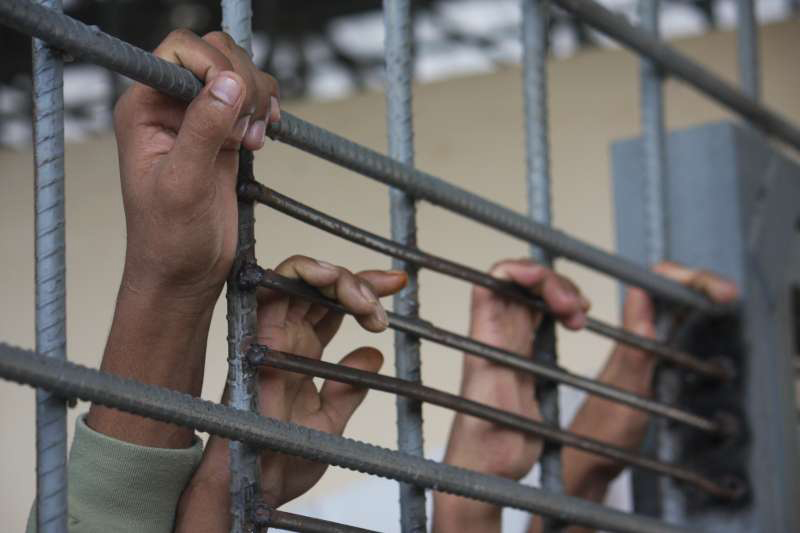The New York Times
the Syrian city of Hama feared a massacre on Monday night as security forces massed outside and the city’s police chief, trapped inside, tried to mediate between them and the government of President Bashar al-Assad.
Among the inmates’ demands were the release of political prisoners and an end to arbitrary trials.
The revolt began last week when its leaders, who say they are mainly civilians arrested for protesting against Mr. Assad’s government, took one of the Syrian opposition’s main grievances — the country’s notoriously brutal penal system — into their own hands.
Weeks ago, the latest round of internationally sponsored peace talks, which were supposed to focus on the plight of prisoners and hostages across Syria’s multisided war, collapsed without any progress.
The revolt created new ferment in Hama, a city that has remained under government control throughout the civil war, but endured a deadly round of uprising and repression in 1982. By Monday evening, tensions were so high that prisoners feared government forces would try to storm the compound by morning.
Half a dozen prisoners have communicated with reporters for The New York Times in recent days and weeks. Some spoke or sent messages on smartphones they acquired through smuggling or by bribing guards — not unusual in Syrian prisons.
Others sent audio messages via two Syrian lawyers, themselves previously detained, one of them for participating in lawyers’ demonstrations in court.
“We are in danger, and we appeal to all the people, anyone who has a conscience, to stand by us, to help us,” one prisoner pleaded in an audio message.
Inmates said they took over the prison last week, for the second time in less than a month, seizing several hostages but soon freeing all but the police chief, Maj. Gen. Ashraf Taha. They said he had volunteered to stay with them until a deal was made.
On Monday, they said that they had gone three days without water or food and that many were falling ill.
But they said they were holding out for a broad deal to free all of them and to allow international monitors into the prisons. They called for the United Nations Syrian envoy, Staffan de Mistura, and the global powers to push for the enforcement of Security Council Resolution 2254, which calls for the protection and release of detainees.
Otherwise, they said, they feared they could be killed or face other reprisals for the revolt.
General Taha told a delegation of prisoners that he had no control over other security agencies and might even be killed along with them, said Fahad al-Moosa, one of the lawyers. Mr. Moosa added that intelligence officials were preventing General Taha from getting his diabetes medicine sent into the prison.
“The regime is using the policy of starvation and subjugation and exhaustion of detainees’ health to break the prison,” Mr. Moosa said from an insurgent-held area where he runs a shelter for released prisoners. “After they take it over, they will start to torture these prisoners.”
Syria’s prisons, ranging from official ones like Hama Central Prison, the site of the revolt, to a network of sites controlled by secret police agencies and pro-government militias, are riddled with torture, arbitrary detention, overcrowding and a lack of food and medicine, according to numerous reports by Syrian and international human rights groups.
Opposition groups say that at least tens of thousands of people are now detained, with families often left in the dark for years about the prisoners’ location and condition.
One antigovernment monitoring group, the Britain-based Syrian Observatory for Human Rights, recently contended that according to government sources, at least 60,000 people had died in detention since the uprising against Mr. Assad began with street protests five years ago.
The government denies such allegations and says its prisoners are terrorists and other criminals.
Many other combatants — armed opposition groups, the Al Qaeda-linked Nusra Front, Islamic State militants and Kurdish fighters, to name a few — are holding prisoners and hostages, but plans for prisoner exchanges as part of the latest round of talks in Geneva never got off the ground.
The revolts have put new pressure on the government to maintain calm in Hama, which is in government-held territory but near several front lines, and has deep historical resonance as the site of an uprising led by the Muslim Brotherhood in 1982.
The first of the two recent revolts in Hama prison began on May 2, when five political prisoners were ordered transferred to intelligence agency prisons, like Saidnaya, where they would be more likely to be tortured or killed.
The government appeared unusually willing to negotiate, sending high-ranking officials. Hama is a high-stakes city. In 1982, Mr. Assad’s father and predecessor, Hafez, suppressed the violent Muslim Brotherhood uprising by leveling much of the city, killing tens of thousands of people.
Many of the detainees are from Hama, and provoking unrest there, even unarmed protests, would be one new headache too much for stretched security forces.
By May 10, a deal was struck to release all 850 political prisoners in batches. But the deal did not last. For a few days, the government released as many as 20 prisoners a day, but soon the numbers dwindled to the single digits.
Some were almost immediately rearrested.
Officials then took away some prisoners’ phones, fortified the prison walls and began pressing for names of those who had organized the revolt or spoken to the news media. Last week, the prisoners revolted again.
Now, the prisoners’ negotiators, Yaser Bargash and Ramez Bakoor, insist that the whole group be released at once, inmates and lawyers said. Failing that, they asked that those slated for transfer to harsher prisons be released first.
Their advocates are trying to set up insurance policies. They have obtained a complete list of all inmates’ names as of now. That way, they said, they can track whether those people disappear.

